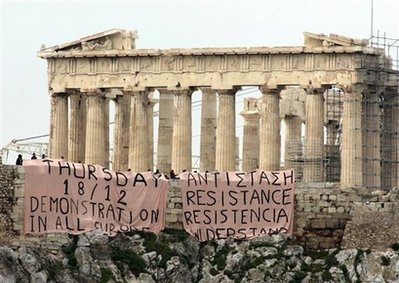Greece explodes in protest to IMF, World Bank, assault
May 4, 2010 1 Comment
Yahoo News
A renewed selling frenzy gripped euro zone financial markets on Tuesday as concern mounted that a record EU/IMF bailout for Greece would not stop a debt crisis spreading in the single currency area.
Greece would not stop a debt crisis spreading in the single currency area.
Spanish Prime Minister Jose Luis Rodriguez Zapatero dismissed as “complete madness” a market rumor that his country would soon ask for 280 billion euros in aid from the euro area.
The euro sank to a one-year low of beneath $1.31 and the risk premium on Greek, Portuguese and Spanish bonds soared amid jitters about a possible Greek debt restructuring and worries over the fiscal health of other southern European countries.
In Athens, striking public workers challenged Greece’s 110 billion euro ($146.5 billion) bailout-for-austerity deal, starting a 48-hour national strike that shut down ministries, tax offices, schools, hospitals and public services.
“There is no faith in what the EU and the IMF have proposed for Greece,” said Dean Popplewell, chief currency strategist at OANDA, a foreign exchange brokerage in Toronto.
“Capital markets are betting on a Greek default, as Greece’s own populace is not going to accept the terms of this rescue, and contagion is a real concern hurting the euro,” he said.
News that Greece has appointed debt restructuring specialists Lazard to provide “general financial advice” fueled speculation that some form of orderly rescheduling or payment moratorium may be likely, despite vehement official denials.
Finance Minister George Papaconstantinou told Reuters after news of the Lazard hire: “Any form of debt restructuring is out of the question.”
Lazard recently advised countries like Argentina, Ecuador and Ivory Coast on sovereign debt restructurings.
“NOT FULLY DOUSED”
The main Greek public sector union, ADEDY, rallied thousands of protesters outside parliament to reject planned wage and pension cuts and demand that the rich foot the bill. Police fired teargas at a small group of protesters who threw rocks and bottles.
“We want an end to the freefall of our living standards,” said Spyros Papaspyros, the head of ADEDY, which represents about half a million workers in the Aegean nation of 11 million.
The cost of insuring Portuguese, Spanish and Irish debt against default jumped as contagion worries spread, Markit data showed. Investors sought a safe haven in U.S. Treasury bonds.
Greek bond yield spreads over benchmark German Bunds spiked above 600 basis points for the first time since Sunday’s euro zone rescue deal, and Greek bank shares plunged by 10 percent on the worsening economic outlook.
Jitters about whether the emergency loan package would be enough to stem the euro zone’s sovereign debt crisis also hammered Spanish stocks.
“This would suggest that contagion fears have not been fully doused, with the Greece rescue terms not allaying fears of states facing similar challenges,” Nomura rate strategist Sean Maloney said.
Worries that the aid package may be insufficient to meet Greece’s borrowing needs contributed to market concerns.
Economists at several European financial firms calculated those needs to the end of 2012 at 120 billion euros, based on latest IMF and Greek government figures. Germany’s Bild daily cited a government estimate of 150 billion euros given to the parliamentary finance committee.
European Commission officials said they expected Athens to be able to return to markets for funding in the second half of 2011 once it had won back credibility by implementing tough reforms.
But that remains a big “if,” given the grim economic outlook and the scale of public opposition.




